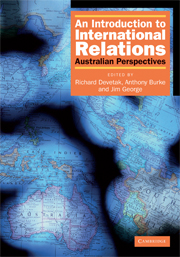Book contents
- Frontmatter
- Contents
- List of tables, figures and boxes
- List of contributors
- Preface and acknowledgments
- An introduction to international relations: the origins and changing agendas of a discipline
- 1 Theory and practice in Australian international relations: the search for identity and security
- Part 1 Theories of international relations
- Part 2 The traditional agenda: states, war and law
- 10 The modern state and its origins
- 11 Nationalism and war
- 12 Security
- 13 Arms control
- 14 The changing character of warfare
- 15 The ethics and laws of war
- 16 International law
- 17 International society and european expansion
- 18 Order and decolonisation in Southeast Asia
- 19 The cold war
- Part 3 The new agenda: globalisation and global governance
- Glossary of terms
- Bibliography
- Index
- References
16 - International law
from Part 2 - The traditional agenda: states, war and law
- Frontmatter
- Contents
- List of tables, figures and boxes
- List of contributors
- Preface and acknowledgments
- An introduction to international relations: the origins and changing agendas of a discipline
- 1 Theory and practice in Australian international relations: the search for identity and security
- Part 1 Theories of international relations
- Part 2 The traditional agenda: states, war and law
- 10 The modern state and its origins
- 11 Nationalism and war
- 12 Security
- 13 Arms control
- 14 The changing character of warfare
- 15 The ethics and laws of war
- 16 International law
- 17 International society and european expansion
- 18 Order and decolonisation in Southeast Asia
- 19 The cold war
- Part 3 The new agenda: globalisation and global governance
- Glossary of terms
- Bibliography
- Index
- References
Summary
Introduction
This chapter presents an account of how international law functions in relation to international relations. First, it surveys the sources and philosophical underpinnings of international law. Second, it outlines the scope of subjects addressed by international law. Third, it considers some of the ways international law impacts on Australia. Finally, it addresses the question of whether international law really matters in international relations.
International law began as a system of law governing relations among states. It has evolved in conjunction with the evolution of the international states-system so as to encompass the activities of intergovernmental organisations, multinational corporations, not-for-profit non-governmental organisations and individuals. It is essential for students of world politics to learn about the functioning of the international legal system because international law is integral to world politics. The breadth of the subject matter encompassed by international law and the increasing complexity of the international legal system mean, however, that even international lawyers often specialise in only a few aspects of international law and whole books are devoted to single topics in international law. This chapter does not attempt to cover all the content of international law but to introduce the reader to how the system of international law functions and to offer guidance as to where to find information on particular subject areas of international law when the need arises.
- Type
- Chapter
- Information
- An Introduction to International RelationsAustralian Perspectives, pp. 190 - 200Publisher: Cambridge University PressPrint publication year: 2007
References
- 1
- Cited by



